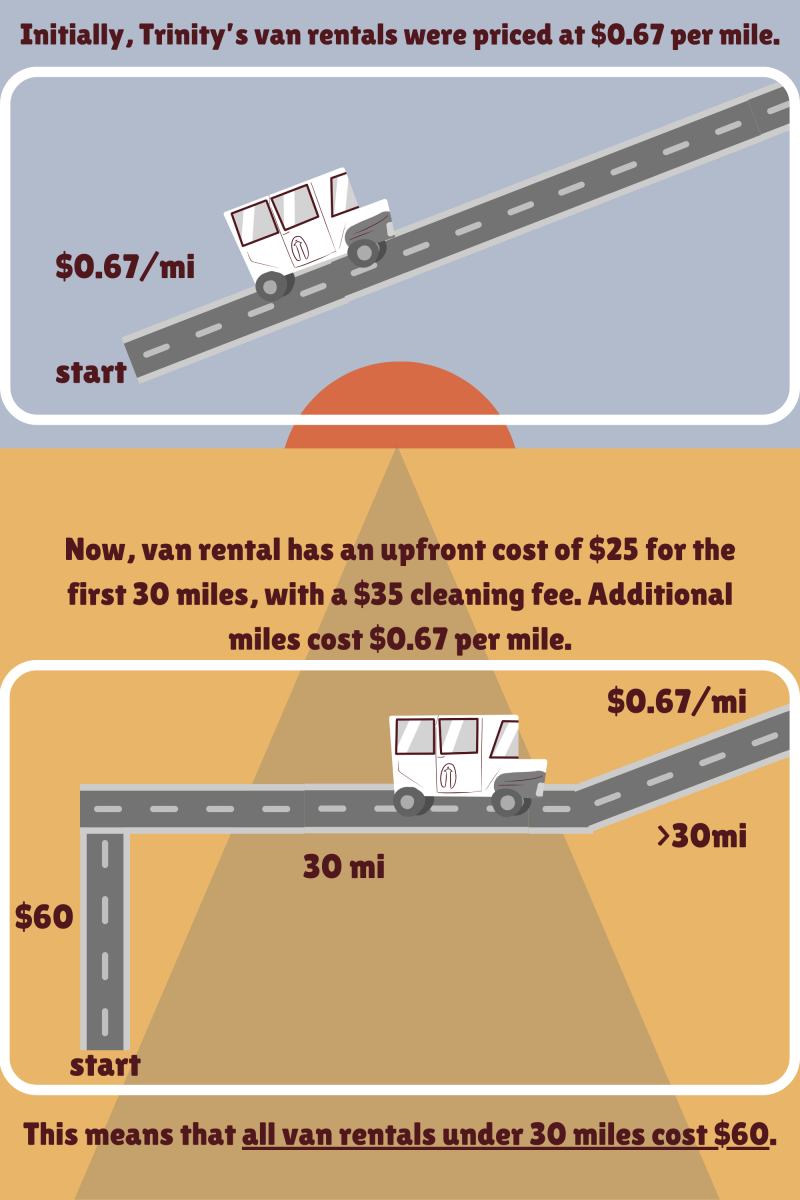Last spring, Trinity University’s Outdoor Recreation Club began planning trips for the Fall 2024 semester. The process seemed unremarkable from years past, and OREC seemed on track to finalize plans. However, as the club started the new semester, OREC’s leadership found that Trinity’s van prices had increased drastically.
“The van prices have been raised significantly by facilities,” Elliott Conely, OREC leader and senior geoscience major, said. “[OREC] pays facilities to use the vans. It’s an interdepartmental fee, and they raise that by more than double in a lot of cases.”
In past semesters, the vans could be rented for $0.67 per mile. However, as outlined in an email from Facilities Services, the cost of renting a van is now $60 for the first 30 miles, including a $35 cleaning fee and a $25 fee. … After 30 miles, the rate continues at $0.67 per mile.
Conely said that the changes limit OREC’s ability to be as active as in past years. As OREC had been informed of the changes after SGA had approved their budget, they were unable to account for the additional costs.
“Right now an eighth of OREC’s annual budget is going just to new fees as of this August, which is causing us to cut back on trips. It sounds minutiae, but it’s significantly detracting from [OREC], so now the cheapest possible van use is … $60 a day, up from like five, per van,” Conely said. “So no Spider Mountain mountain biking this year, and then there’s going to be a pretty big cut next semester.”
Trinity’s Facilities Services department monitors the use and upkeep of university vehicles. Ernesto Gonzalez, director of Facilities Services, explained the recent changes in an email.
“The new $35 van rental fee was introduced in response to long-standing concerns about van cleanliness and upkeep. Historically, Facilities Services covered all maintenance, insurance and repair costs, with renters only paying mileage.” Gonzalez wrote. “The fee provides access to Washtub services to keep vans consistently clean and presentable with a much faster turnaround to meet the high rental demands. The Washtub services are also available to the customer renting the van if they are unhappy with the condition of the vehicle.”
Gonzalez explained why the changes happened after the club’s budgets had been decided. He explained that although the timing was not ideal, the changes were necessary.
“The timing of the new fee was based on operational needs rather than budget cycles. As the demand for clean, ready-to-use vehicles grew, the need for external support through Washtub access became clear. Although we understand the timing was challenging, the decision was made to ensure all renters benefit from a well-maintained fleet that meets campus standards,” Gonzalez wrote.
OREC is not the only organization that has noticed the changes. Jamie Thompson, director of Strategic Initiatives, supports the Trinity Voter Engagement Task Force. When planning for Roll to the Polls, an event sponsored by the task force to transport students to voting locations, Thompson discovered the increase in van rental fees. Thompson stated the importance of communication between clubs and the university so that clubs could be notified of fees early on.
“I just had to budget accordingly and plan for that after the fact as opposed to you know my pre-planning and on the proactive side. So I think that that is probably an opportunity for improvement,” Thompson said. “Ensure the campus community is aware of what the new fee structure is so that they can budget and plan accordingly.”







